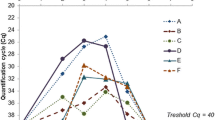Abstract
Leptospirosis is an important zoonosis that in cattle is characterized as a reproductive disease. It is well reported that the main agent of bovine leptospirosis worldwide is Sejroe serogroup serovar Hardjo. Reproductive disease in cattle has several gaps in its knowledge and studies with Golden Syrian hamsters, experimentally infected, are limited. Therefore, a protocol that could reproduce the chronic genital disease in hamsters would be extremely valuable for the advance of the knowledge of that syndrome. The aim of this study was to establish an experimental protocol for chronic non-lethal genital infection of female hamsters by L. santarosai serovar Guaricura (Sejroe serogroup), strain 2013_VF52. For this, two concentrations (1.0 × 108 leptospires/mL and 1.0 × 104 leptospires/mL) were used intraperitoneally in female hamsters of 06–08 weeks of age. Hamsters that survived for up to forty days after inoculation were euthanized. Uterine and renal tissues were collected to evaluate leptospires’ presence by PCR and culture. The protocol demonstrated that 1.0 × 104 leptospires/mL of the strain determined chronic genital leptospirosis in the hamster model. The standardization of a protocol for chronic genital leptospirosis in hamsters can be extremely useful for the understanding of the physiopathology of the infection, as the distribution of leptospires in the uterus and the agent-host interactions.
Similar content being viewed by others
References
Barbosa C, Martins G, Lilenbaum W (2016) Blood collection by gingival puncture on hamsters reduces animal number in leptospirosis virulence tests. Altex 33(3):322–323
Barbosa C, Martins G, Lilenbaum W (2019a) Atypical virulence of Leptospira kirschneri serogroup Icterohaemorrhagiae isolated from capybaras (Hydrochoerus hydrochaeris) in hamster model. Microb Pathog Jan 126:134–137. https://doi.org/10.1016/j.micpath.2018.10.032
Barbosa C, Martins G, Lilenbaum W (2019b) Infectivity and virulence of leptospiral strains of serogroup sejroe other than Hardjo on experimentally infected hamsters. Braz J Microbiol Oct 50(4):1129–1132. https://doi.org/10.1007/s42770-019-00122-1
Charles River Laboratory (2023) LVG Golden Syrian Hamster. https://www.criver.com/products-services/find-model/lvg-golden-syrianhamster?region=3621#. Accessed 28 February 2023
Ellis WA (2015) Animal leptospirosis. Curr Top Microbiol Immunol 387:99–137. https://doi.org/10.1007/978-3-662-45059-8_6
Gomes CK, Guedes M, Potula HH, Dellagostin OA, Gomes-Solecki M (2018) Sex Matters: Male Hamsters Are More Susceptible to Lethal Infection with Lower Doses of Pathogenic Leptospira than Female Hamsters. Infect Immun Sep 21;86(10):e00369-18. doi: https://doi.org/10.1128/IAI.00369-18
Haake DA (2006) Hamster model of leptospirosis. Curr Protoc Microbiol, Sep;chap. 12:unit 12E.2. https://doi.org/10.1002/9780471729259.mc12e02s02
Hamond C, Martins G, Lilenbaum W et al (2015) Infection by Leptospira spp. in cattle in a tropical region, Rio de Janeiro, Brazil. Am J Trop Med Hyg Jan 92(1):210. https://doi.org/10.4269/ajtmh.14-0519
Langford DJ, Bailey AL, Chanda ML et al (2010) Coding of facial expressions of pain in the laboratory mouse. Nat Methods Jun 7(6):447–449. https://doi.org/10.1038/nmeth.1455
Loureiro AP, Hamond C, Pinto P et al (2016) Molecular aalysis of leptospires from serogroup Sejroe obtained from asymptomatic cattle in Rio de Janeiro - Brazil reveals genetic proximity to serovar Guaricura. Res Vet Sci Apr 105:249–253. https://doi.org/10.1016/j.rvsc.2016.02.012
Loureiro AP, Lilenbaum W (2020) Genital bovine leptospirosis: a new look for an old disease. Theriogenology Jan 1:141:41–47. https://doi.org/10.1016/j.theriogenology.2019.09.011
Miyahara S, Saito M, Kanemaru T et al (2014) Destruction of the hepatocyte junction by intercellular invasion of Leptospira causes jaundice in a hamster model of Weil’s disease. Int J Exp Pathol Aug 95(4):271–281. https://doi.org/10.1111/iep.12085
Pinto PS, Libonati H, Penna B, Lilenbaum W (2016) A systematic review on the microscopic agglutination test seroepidemiology of bovine leptospirosis in Latin America. Trop Anim Health Prod Feb 48(2):239–248. https://doi.org/10.1007/s11250-015-0954-9
Rocha BR, Balaro M, Pereira PV et al (2018) Chronic experimental genital leptospirosis with autochthonous Leptospira santarosai strains of serogroup Sejroe. Small Ruminant Research 164:28–31. https://doi.org/10.1016/j.smallrumres.2018.04.015
Santa Rosa CA, Sulzer CR, Castro AF et al (1980) Two new leptospiral serovars in the Hebdomadis group isolated from cattle in Brazil. Int J Zoonoses 01(2):158–163
Van Hoosier JrGL (ed), McPherson CW (eds) (eds) (1987) Laboratory Hamsters. American College of Laboratory Animal Medicine. Academic Press 1st Edition. New York, pp 269–270
Zuerner RL, Alt DP, Palmer MV (2012) Development of chronic and acute golden syrian hamster infection models with Leptospira borgpetersenii serovar Hardjo. Vet Pathol Mar 49(2):403–411. https://doi.org/10.1177/0300985811409252
Acknowledgements
The authors are thankful to Dra J. B. Souza of Rio de Janeiro State University (UERJ) for providing the hamsters. This work was supported by the National Council for Scientific and Technological Development (CNPq) Universal project (grant number 423415/2021-2) and by the Coordination for the Improvement of Higher Education Personnel (Coordenação de Aperfeiçoamento de Pessoal de Nível Superior - CAPES) - Finance Code 001. We thank the Postgraduate Program in Microbiology (Federal University of Bahia – UFBA) and Mitermayer Galvão dos Reis for their support.
Funding
WL is a FAPERJ and CNPq fellow, MINDA is a FAPERJ fellow.
Author information
Authors and Affiliations
Contributions
Cristina Barbosa: Conceptualization, Investigation, Methodology, Data curation, Writing – original draft, Writing – review & editing; Anderson dos Santos Oliveira: Conceptualization, Investigation, Methodology, Data curation, writing – original draft, Writing – review & editing; Julia Santos Mendes: Investigation, Methodology; Paula Ristow: Conceptualization, Supervision, Funding acquisition, Data curation, Writing–reviewing and Editing; Walter Lilenbaum: Conceptualization, Supervision, Funding acquisition, Resources, Data curation, Writing– Reviewing and Editing. All authors reviewed the manuscript.
Corresponding author
Ethics declarations
Declaration of competing interest
The authors declare that there are no conflicts of interest.
Ethical statement
Ethical Committee approved this research for Animal Use at Federal Fluminense University (protocol 4778010519).
Additional information
Publisher’s Note
Springer Nature remains neutral with regard to jurisdictional claims in published maps and institutional affiliations.
Rights and permissions
Springer Nature or its licensor (e.g. a society or other partner) holds exclusive rights to this article under a publishing agreement with the author(s) or other rightsholder(s); author self-archiving of the accepted manuscript version of this article is solely governed by the terms of such publishing agreement and applicable law.
About this article
Cite this article
Barbosa, C., Oliveira, A.d., Mendes, J.S. et al. Standardization of chronic uterine infection of hamsters by Leptospira santarosai serovar Guaricura, from serogroup Sejroe. Vet Res Commun 47, 2215–2219 (2023). https://doi.org/10.1007/s11259-023-10108-y
Received:
Accepted:
Published:
Issue Date:
DOI: https://doi.org/10.1007/s11259-023-10108-y




